Beginner's Guide to Forgotten Runiverse
Introduction
Welcome, adventurer, to the mystical world of Forgotten Runiverse! This guide is designed to help you understand the game’s core mechanics, including the Land System, Energy System, Dungeon System, Crafting System, Class System, Gacha System, Combat System, and Equipment System. Whether you’re crafting, building, battling, or customizing your hero, we’ll break it down to make your journey fun and rewarding.
Click the section titles below to dive into detailed explanations. Check back for updates on combat and progression tips!
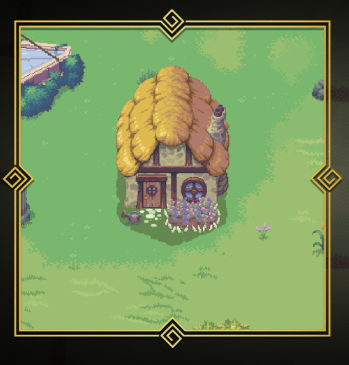
Land System
Land is the core force of Forgotten Runiverse. It gives players the ability to shape the game’s economy from scratch, with numerous player-owned plots scattered across the world. These plots allow players to build various structures that are key to player progression. By owning land, you collaborate with other players to shape the game world.
Main Advantages of Land
- Ability to shape the world and economy
- Receiving bonuses from using structures
- Receiving bonuses when other players use your structures
While resources can be found in the wild, it is much easier and more scalable to gather them at player-owned stations. Plots provide a reliable source of essential physical materials needed to craft everything from necessities like armor and memory crystals for spells to decorative home items.
Structures Available for Building on Your Land
View all available buildings at this page.
- Homestead
 Gathering Station: Gather resources from your land that can be used to craft items
Gathering Station: Gather resources from your land that can be used to craft items Small House: Your personal home, which can be decorated with crafted items and increases your Energy, a resource used for crafting and inscribing that refills periodically. See details about the energy bonus in the Energy System section.
Small House: Your personal home, which can be decorated with crafted items and increases your Energy, a resource used for crafting and inscribing that refills periodically. See details about the energy bonus in the Energy System section.
- Settlement
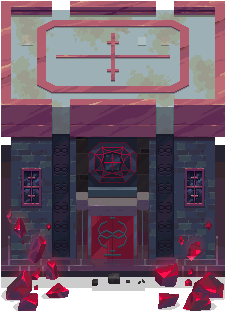 Mage Workshops: Craft Crystals of AbilityItems used to learn new spells. for learning new spells
Mage Workshops: Craft Crystals of AbilityItems used to learn new spells. for learning new spells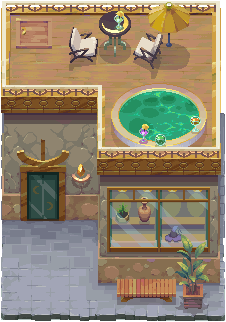 Atelier: Create decorations for your home
Atelier: Create decorations for your home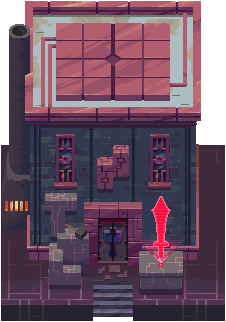 Forge: Craft gear
Forge: Craft gear Large House: A larger customizable player home
Large House: A larger customizable player home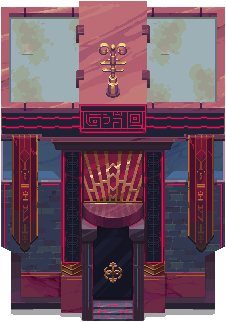 Temple: Sacrifice items in exchange for ManaA magical resource used for crafting, energy, and special actions., a key resource in the game, among other resources
Temple: Sacrifice items in exchange for ManaA magical resource used for crafting, energy, and special actions., a key resource in the game, among other resources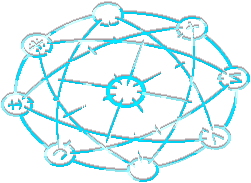 Large Gathering Station: A larger gathering area for collecting more resources
Large Gathering Station: A larger gathering area for collecting more resources
- Village / Town
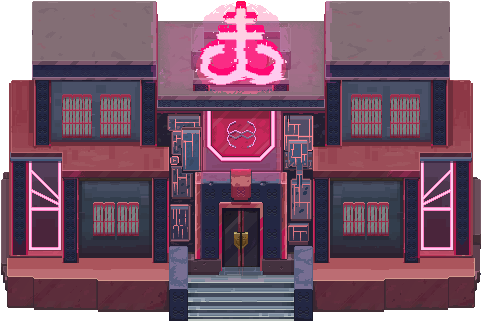 Guild Hall: Allows players to form guilds, decorate together, participate in guild quests, shop at the guild store, and access additional storage
Guild Hall: Allows players to form guilds, decorate together, participate in guild quests, shop at the guild store, and access additional storage City Stone: Enables fast travel to other locations and makes this location a fast-travel destination
City Stone: Enables fast travel to other locations and makes this location a fast-travel destination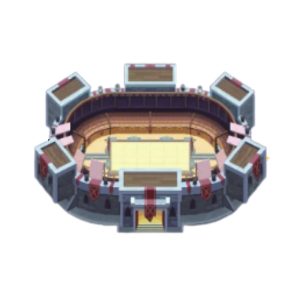 Arena: Allows players to fight each other in PvP mode
Arena: Allows players to fight each other in PvP mode
When developing your land, you will need to consider both the type of structure you want to build and its color, as these factors determine its specialization. For example, building a Red Mage Workshop allows you to craft high-level Red Mage Crystals of AbilityItems used to learn new spells. on your property, but you won’t be able to craft high-level Blue Mage crystals there. For that, you would need to build a Blue Mage Forge.
Crafting structures also have limits on the number of recipes they can hold. This limitation makes it impossible for a single plot to provide everything a player might need, thereby encouraging trade and collaboration. You can explore the list of required materials for construction, as well as their costs, in the Database → Building section.
Plot Sizes
The size of your plot determines how many structures you can build. Larger plots can accommodate more structures and can also be subdivided into smaller plots. Plot sizes are divided into the following tiers:
| Size | Dimensions | Total Available |
|---|---|---|
| Homestead | 8×8 | 52,500 |
| Settlement | 16×16 | 16,828 |
| Village | 32×32 | 560 |
| Town | 64×64 | 105 |
| City | 128×128 | 7 |
Material Deposits
The types of materials you find on your plot depend on its region. You can view a list of all materials on our website in the Database → Resource section. With over 50 materials available, plots can be rich in variety and have many different types assigned to them. The region where your plot is located determines which types of materials can appear on your land, so those who want to gather as many different resource types as possible will find great benefit in owning various plots across different locations on the map.
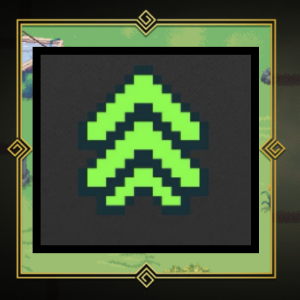
Energy System
Plot Energy
The Plot Energy SystemA mechanic that limits how often you can perform actions on a plot, encouraging strategic planning. allows for more even distribution of production across the world. Each type of plot has its own energy reserve, which refills every 4 hours.
| Plot Type | Energy Reserve |
|---|---|
| Homestead | 500 |
| Settlement | 5,000 |
| Village | 25,000 |
| Town | 50,000 |
Actions such as craftingCreating items like weapons or tools using resources. and inscribingAdding magical runes to items for special effects. on a plot consume energy from this reserve. Players can reduce energy consumption by infusing their plots with ManaA magical resource used for crafting, energy, and special actions. or spend Mana directly when the reserve is depleted.
Rest System
Just like land plots, players have their own energy reserve. Currently, this is set to 60,000 energy.
The Rest SystemA system that affects your rewards and progress based on your character's stamina. is designed to improve the pace of rewards and reduce grind fatigue. It helps balance drop rates, discourages bot activity, provides regular players with a more consistent sense of progression, and offers strategic opportunities for hardcore players.
Each day, players start in a Well-RestedA state that boosts your rewards and progress. state, which enhances:
- Drop RatesThe chance of getting items from enemies or resource nodes.
- Chances of collecting Quanta and ManaResources used for crafting and special actions.
- Resource gathering efficiency
- Experience gain for leveling up
As you perform in-game activities (such as battling or crafting), your Rest level gradually decreases, along with these bonuses. Eventually, you reach the Tired state, where penalties begin, and progression slows significantly.
All available Rest states:
Well-Rested: Bonuses to farming, leveling, and resource gathering
Rested: Neutral state (no bonuses or negative effects)
Tired: Moderate penalties to farming and progression
Exhausted: More severe penalties to farming and progression
Players can simply log out of the game for a few hours to recover Rest. Logging out in your home grants a higher Rest recovery rate:
- Base regeneration per hour: 2,400 Rest
- Small House regeneration: 3,120 Rest
- Large House regeneration: 3,840 Rest
- Large House with max Comfort bonus: 5,280 Rest
Decorate with comfortable items: Furniture and decorations with the Comfort property increase your home’s Rest recovery rate.
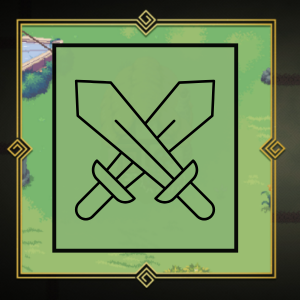
Combat System
Forgotten Runiverse features an active turn-based combat system. There is a cooldown between enemy and player actions, determined by the action bar at the bottom of the screen.
Actions can only be performed after a character’s portrait reaches the light blue point on the action bar.
Some abilities can affect the action bar through status effects. When these abilities are applied, a character’s movement on the bar can shift to the right (applying a speed-up effect) or to the left (slowing down action speed).
Enemies and allies do not need to wait for each other’s turns to complete.
Players can team up in groups of up to 4 people. Teaming up is key to winning more challenging battles, as facing tougher enemies requires more strategy, and a group of reliable teammates can help you succeed.
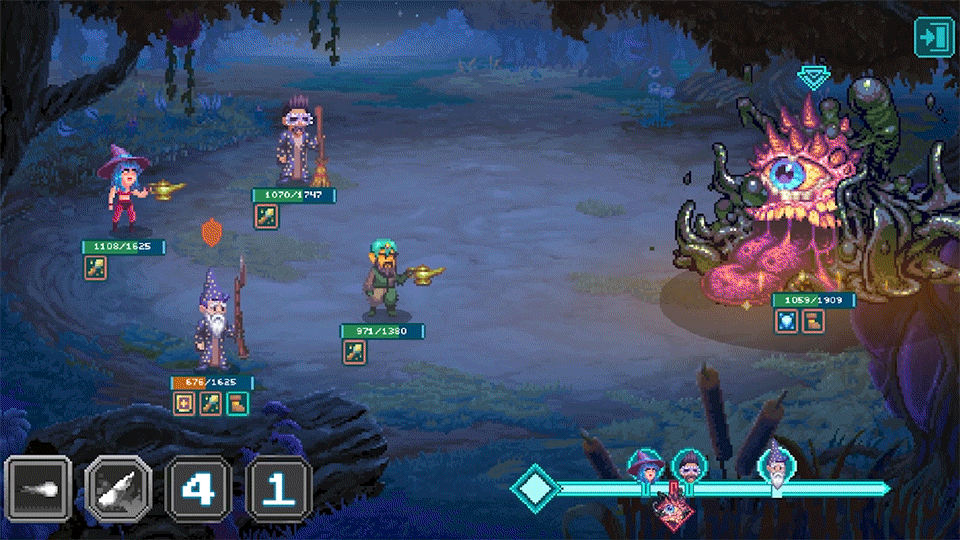
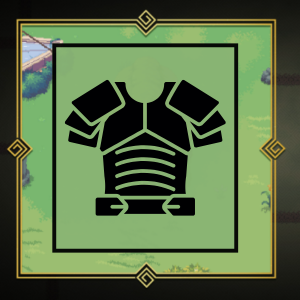
Equipment System
The game features two types of equipment that you can equip:
Gear
1. Gear Items: These can be of the Helm, Armor, or Weapon type.
They have a number of affixes, as described in the Crafting System, which affect the hero’s stats. Forgotten Runiverse is unique in that weapons and armor do not have inherent armor or damage stats, only a system of bonuses that influence the hero’s overall stats.
Memory Crystals
2. Memory Crystals: Players equip memory crystals to gain access to various spells and stat boosts.
Spells directly affect the hero’s primary stats:
- Str: Physical damage strength
- Int: Magical damage strength
- Dex: Attack speed and agility
- Lck: Critical hit chance and critical hit damage
- Con: Health, physical damage resistance, and shield strength
- Wis: Healing strength, magical attack resistance, and status resistance
Ability Types
The following types of abilities are available:
- Novice Abilities: Basic combat skills that remain useful throughout the game. Examples include damage-dealing spells like Fireball or supportive abilities like Heal.
- Higher Abilities: Unlocked upon obtaining a specialization.
- Heart Abilities (Not yet implemented): Passive enhancements unlocked by gaining experience. These abilities can complement your specialization and improve your primary stats.
- Soul Abilities (Not yet implemented): Ultimate high-level skills with a separate action bar.
Specialization
Heroes always have the option to equip a specialization.
A specialization provides additional bonuses to the hero’s stats and unlocks specialization-specific skills.
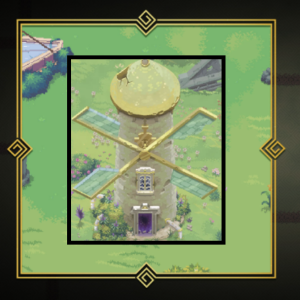
Dungeon System
Dungeons are a crucial part of the Forgotten Runiverse world, allowing players to team up in groups and battle hordes of enemies in search of the best rewards.
Each dungeon in the game has its own level. Here is a list of the currently available dungeons:
The Hollow Tree: Level 12
Windmill Of The Wild: Level 17
Crib Of The Moon: Level 20
Moon Temple: Level 23
The Buried Pyramid: Level 25
All dungeons feature a room-based structure where you fight through enemies to reach a boss. Defeating the boss allows you to progress to the next room. The number of rooms and bosses varies by dungeon. Some dungeons may also have hidden bosses, accessible by performing secret actions or completing a specific sequence of actions.
Dungeons are the best place to earn materials, gold, and recipes due to their Omens SystemA system that modifies dungeon difficulty and rewards based on selected challenges.. There are 5 Omens available to choose from:
Frail Hands: The party suffers enfeeble for the duration of the dungeon.
Bum-Rush: Enemies gain haste for the duration of the dungeon.
Past Allergies: The party suffers poison for the duration of the dungeon.
Brittle Bones: The party suffers stagger for the duration of the dungeon.
Big Bad Meanies: The enemies are five levels stronger for the duration of the dungeon.
You can choose one or all of the Omens. Selecting all 5 Omens grants a 6x multiplier to materials and gold dropped, as well as a 6x increased chance of item drops! Keep in mind that the more Omens you select, the more difficult the dungeon becomes, so a well-coordinated group is crucial for tougher dungeons.
You can view the completion of all dungeons in the Quest / Dungeon tab. Maps for each dungeon can be obtained on the Interactive Map page.
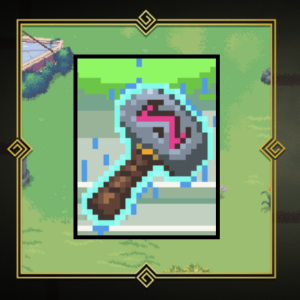
Crafting System
Crafting is a vital part of Forgotten Runiverse and supports the philosophy of "create to earn." Every crafted item is unique and can be inscribed to be added to the blockchain.
To craft anything, you need a recipe that lists all the required materials for crafting, such as currency, materials, and resources.
Materials
The first part of crafting is gathering resources and materials. In the Runiverse, there are two types of materials:
Physical Materials: Gathered from the world
Spiritual Materials: Gathered from its inhabitants
Everything you can craft requires at least one physical and one spiritual material, so it’s crucial to gather both.
It’s important to understand that spiritual materials can only be obtained through battles. When you defeat an enemy, there is a chance for a spiritual material to drop.
There is also another type of resource called ManaA magical resource used for crafting, energy, and special actions.  . Mana is the result of creativity in the world—it can be obtained by offering (destroying) crafted items in a Temple to release the magic contained within them.
. Mana is the result of creativity in the world—it can be obtained by offering (destroying) crafted items in a Temple to release the magic contained within them.
You can offer any crafted item, but the rarer and higher-level the item, the more Mana you will receive. When crafting new items, you can infuse them with Mana to increase the chances of a good outcome.
Recipes
You will need a recipe for everything you create, and this recipe will tell you which materials are required to craft the item. You will find recipes for crafting memory crystals to enhance stats and provide abilities, gear to amplify memory crystals, and decorations that can be applied to buildings and land plots.
Recipes are obtained in three ways: in combat, by exploring the wild, and during events. The rarest recipes drop from challenging quests, bosses, and special events.
Once you obtain a recipe, you have several options:
- Trade your recipe with other players
- Offer it in a Temple to earn ManaA magical resource used for crafting, energy, and special actions.
- Inscribe it in a Forge, Mage Workshop, or Atelier
If you inscribe a recipe in a Forge, Mage Workshop, or Atelier where that recipe has already been inscribed, you can inscribe it again to improve the existing recipe and increase the likelihood of a good outcome when a player uses it. You can also inscribe it in another building in the world that doesn’t yet have that recipe.
Importantly, you earn QuantaA resource earned from inscribing recipes, crafting items, or offering them. for inscribing recipes, crafting items, and offering them, which allows you to earn additional rewards.
When you are ready to craft an item, you can infuse it with Mana to improve its stats or craft it normally.
In either case, once you craft an item, you receive a pool of affixes.
Affixes
Affixes are passive abilities or bonuses that enhance what memory crystals provide. Gear amplifies the bonuses of your crystals.
There are three types of affixes:
Defensive: Defensive affixes
Offensive: Offensive affixes
Support: Support affixes
All these affixes are generated from an item’s affix pool, which determines what you can receive.
You can learn more about affix pools for each item here.
Item Color System
The game also features an item color system. Each piece of gear or ability has its own color. For example, rare green items can only be crafted in a green Forge 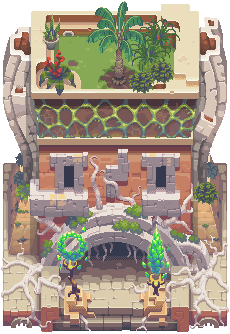 . The same applies to other colors.
. The same applies to other colors.
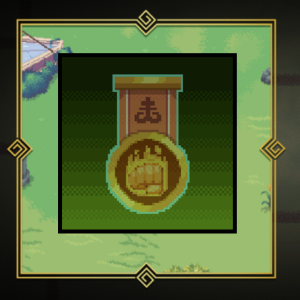
Class System
The Class System helps players unlock their hero’s potential. There are 8 classes available to choose from, each offering a unique playstyle. By selecting a class, you can choose the role that resonates most with you.
There are 4 roles available:
- DD - Damage Dealer: Focuses on dealing damage
- Heal - Healing Class: Specializes in healing allies
- Tank - Defensive Class: Emphasizes defense and survivability
- Buffer - Helping Class: Provides support and buffs to the team
It’s important to understand that the game does not restrict players to specific gear based on their class. For example, you can be a Tank wearing Healer armor or vice versa. However, the game limits the list of spells each class can equip.
Below is the list of classes and their associated spells:
Botanic Master
Beast Sage
Rave Mage
Harmonic Guru
Firewall Defender
Fire Fist
Arctic Warden
Scholar
A more detailed description of each class is available here.
It’s important to understand that game classes can only be unlocked by following a specialization path, which grants access to your inner strength. Follow our quest completion tips at this page to easily unlock any class you like.
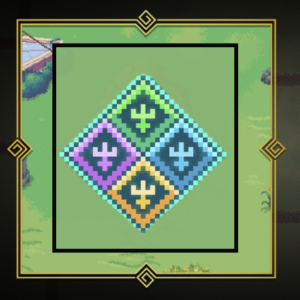
Gacha System
The Font of MemoryA gacha system where players spend Mana to obtain unique rewards, including boosts. is an exciting gacha system where players spend ManaA magical resource used for crafting, energy, and special actions.  to obtain various unique rewards, including boosts.
to obtain various unique rewards, including boosts.
Each season provides a new cosmetic set, including head, body, and weapon parts. These exclusive items are only available during the active season.
Players purchase pulls using Mana. The following pull mechanics are available:
- Soft Pity: Triggers after a certain number of regular pulls, increasing the chances on the next pull.
- Hard Pity: Reached after a prolonged number of pulls, offering the best chances for the most valuable rewards.
This system ensures that all participants receive valuable rewards, with guaranteed prizes for those who participate more frequently.
Potions
The gacha system also allows players to obtain valuable in-game potions. The following potions are available:
 Exp: Increases the rate of experience gained
Exp: Increases the rate of experience gained Gathering: Increases the chance of gathering resources
Gathering: Increases the chance of gathering resources Mana: Increases the chance of obtaining Mana
Mana: Increases the chance of obtaining Mana Drop: Increases the chance of item drops
Drop: Increases the chance of item drops
These boosts help players expand their gameplay progression opportunities. Activating the same type and rarity of boost extends its duration. If a higher-quality boost is activated, it temporarily overrides any lower-quality boosts. Once the higher-quality boost expires, the lower-quality boost resumes from where it left off.
Plot owners can restrict access to their land by setting an approved visitors list, controlling who can craft or build on their plot.
Tips for Beginners
- Manage Permissions: If you own a plot, use the plot settings to add trusted friends to your visitors list.
- Check Plot Access: When visiting another player’s plot, ensure you’re on their approved list to perform actions.
- Look for Updates: A future update will add a ban list for even more control over your plot.